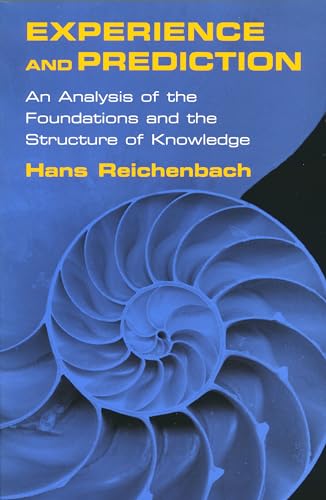
Sinossi
Hans Reichenbach (1891–1953) was a formidable figure in early-twentieth-century philosophy of science. Educated in Germany, he was influential in establishing the so-called Berlin Circle, a companion group to the Vienna Circle founded by his colleague Rudolph Carnap. The movement they founded—usually known as "logical positivism," although it is more precisely known as "scientific philosophy" or "logical empiricism"—was a form of epistemology that privileged scientific over metaphysical truths. Reichenbach, like other young philosophers of the exact sciences of his generation, was deeply impressed by the far-reaching changes in physics brought about by Einstein's special and general theories of relativity. Reichenbach responded to scientific advances by doing fundamental work in space-time theories, in quantum mechanics, in statistical mechanics, and in the development of probability theory—making him the most important philosopher of physics in the first generation of logical empiricism. Forced from his academic position by the Nazi race laws in 1933, Reichenbach wrote Experience and Prediction at the University of Istanbul, where had had fled, expressly to introduce logical positivism to English speakers. In the two decades following World War II, during the explosion of scientific advances in North America, logical positivism was the reigning theory of the philosophy of science and Reichenbach was at the peak of his career. But, inevitably, support for logical positivism began to wane as it became obvious that the justification of scientific theories could not be entirely resolved by relying on strictly formal, technical processes. The growth of the discipline of the history of philosophy of science, which has created an audience of scholars eager for seminal classics in scientific philosophy, and the evidence supporting a historicist paradigm within logical positivism are two important reasons to make Experience and Prediction available once again.
Le informazioni nella sezione "Riassunto" possono far riferimento a edizioni diverse di questo titolo.
Informazioni sull?autore
Le informazioni nella sezione "Su questo libro" possono far riferimento a edizioni diverse di questo titolo.
Altre edizioni note dello stesso titolo
Risultati della ricerca per Experience And Prediction: An Analysis of the Foundations...
Experience and Prediction: An Analysis of the Foundations and the Structure of Knowledge
Da: HPB-Red, Dallas, TX, U.S.A.
paperback. Condizione: Good. Connecting readers with great books since 1972! Used textbooks may not include companion materials such as access codes, etc. May have some wear or writing/highlighting. We ship orders daily and Customer Service is our top priority! Codice articolo S_451662045
Compra usato
Spedito in U.S.A.
Quantità: 1 disponibili
Experience and Prediction: An Analysis of the Foundations and the Structure of Knowledge
Da: Lucky's Textbooks, Dallas, TX, U.S.A.
Condizione: New. Codice articolo ABLIING23Feb2215580085902
Compra nuovo
Spedito in U.S.A.
Quantità: Più di 20 disponibili
Experience and Prediction An Analysis of the Foundations and the Structure of Knowledge
Print on DemandDa: Revaluation Books, Exeter, Regno Unito
Paperback. Condizione: Brand New. new edition edition. 456 pages. 8.25x5.50x1.25 inches. In Stock. This item is printed on demand. Codice articolo __0268040559
Compra nuovo
Spedito da Regno Unito a U.S.A.
Quantità: 1 disponibili
Experience and Prediction: An Analysis of the Foundations and the Structure of Knowledge
Da: Chiron Media, Wallingford, Regno Unito
PF. Condizione: New. Codice articolo 6666-IUK-9780268040550
Compra nuovo
Spedito da Regno Unito a U.S.A.
Quantità: 10 disponibili
Experience and Prediction
Da: Books Puddle, New York, NY, U.S.A.
Condizione: New. pp. xliv + 410. Codice articolo 263836899
Compra nuovo
Spedito in U.S.A.
Quantità: 4 disponibili
Experience and Prediction: An Analysis of the Foundations and the Structure of Knowledge
Da: THE SAINT BOOKSTORE, Southport, Regno Unito
Paperback / softback. Condizione: New. New copy - Usually dispatched within 4 working days. Codice articolo B9780268040550
Compra nuovo
Spedito da Regno Unito a U.S.A.
Quantità: 1 disponibili
Experience and Prediction
Da: Majestic Books, Hounslow, Regno Unito
Condizione: New. Print on Demand pp. xliv + 410 Illus. Codice articolo 5059644
Compra nuovo
Spedito da Regno Unito a U.S.A.
Quantità: 4 disponibili
Experience and Prediction
Da: Biblios, Frankfurt am main, HESSE, Germania
Condizione: New. PRINT ON DEMAND pp. xliv + 410. Codice articolo 183836905
Compra nuovo
Spedito da Germania a U.S.A.
Quantità: 4 disponibili
Experience and Prediction: An Analysis of the Foundations and the Structure of Knowledge
Da: THE SAINT BOOKSTORE, Southport, Regno Unito
Paperback / softback. Condizione: New. This item is printed on demand. New copy - Usually dispatched within 5-9 working days 624. Codice articolo C9780268040550
Compra nuovo
Spedito da Regno Unito a U.S.A.
Quantità: Più di 20 disponibili
Experience and Prediction
Da: moluna, Greven, Germania
Kartoniert / Broschiert. Condizione: New. Dieser Artikel ist ein Print on Demand Artikel und wird nach Ihrer Bestellung fuer Sie gedruckt. Hans Reichenbach was a formidable figure in early-twentieth-century philosophy of science. In the two decades following World War II, logical positivism was the reigning theory of the philosophy of science and Reichenbach was at the peak of his career. He w. Codice articolo 446864973
Compra nuovo
Spedito da Germania a U.S.A.
Quantità: Più di 20 disponibili

